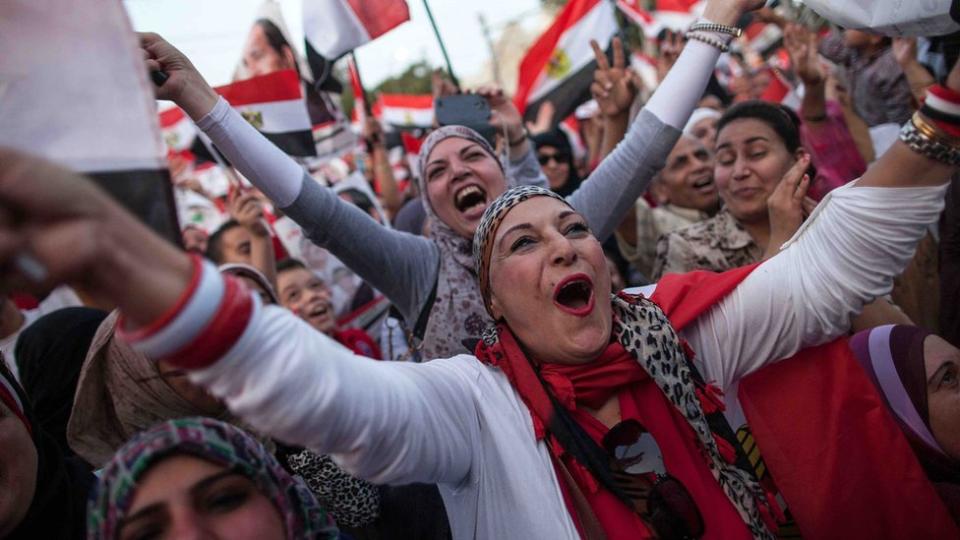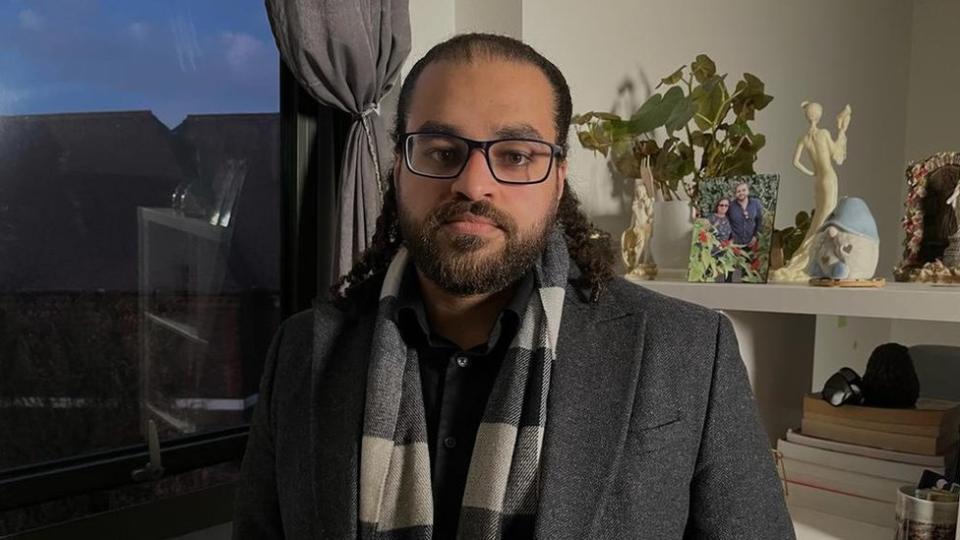Once hailed by many people as a saviour, Egypt’s strongman leader Abdul Fattah al-Sisi is now seen in a very different light.
Egyptians who took to the streets to cheer for the general-turned-president a decade ago are not as happy as they hoped they would be.
As Mr Sisi runs for his third consecutive term as president next week, a crumbling economy is top of most people’s list of complaints.
Nadia is one of those struggling to make ends meet as Mr Sisi’s government continues to implement what it calls “economic reforms”.
The 57-year-old widow and mother of six can barely make a living selling newspapers at a street-side kiosk.
In her small flat in one of Cairo’s crowded slums, Nadia tells me that she last bought meat three years ago. To her, life is becoming more unaffordable by the day.

“I am too scared to go to sleep sometimes, because I know the next morning prices will have gone up,” she says with a faint smile and eyes full of pain.
The latest official figures show that Egypt’s inflation rate in October was 38.5%, a slight fall from the record 40.3% reported the previous month.
These numbers are unheard of in the Arab world’s most populous country, and the real inflation rate experienced by ordinary people is often much worse than the government’s figure.
‘We are forgotten’
But as prices have risen, Nadia’s income has dropped.
More than a decade ago, she used to sell nearly 200 newspapers a day, but today it is barely 20.
Nadia says today cooking a meal costs between 300 and 500 Egyptian pounds (£7.70-£13; $9.70-16.20), but a few years ago it was about a sixth of the price.
“Even fruit is too expensive,” she tells me.


In the past nine months, the Egyptian pound has lost more than 50% of its value against the US dollar.
With the Egyptian economy heavily dependent on imports, the prices of basic commodities have skyrocketed beyond the reach of many households and a black market for foreign currency has flourished.
Nadia does not have much hope and is obviously apprehensive.
“No-one thinks of the poor. It’s as if we are invisible,” she says, adding with a sigh: “We are forgotten.”
Promises of prosperity
Since Mr Sisi became president in 2014 – a year after he led the military’s overthrow of his Islamist predecessor, Mohammed Morsi – huge sums of money have been spent on huge infrastructure projects.
Roads have been expanded and flyovers built, and a new capital costing billions of dollars has been constructed near Cairo that is barely inhabited.
Critics say this “financial imprudence” has drained much of the country’s economic resources and created unprecedented levels of debt that have crippled the economy.
The president’s supporters believe the urban expansion has made people’s lives easier and will help attract much needed foreign investment, eventually ushering in more prosperous times.
Walid Gaballah, an economist and a member of Egyptian Society for Political Economy, Statistics and Legislation, believes these projects have created jobs and succeeded in making a significant impact in addressing Egypt’s unemployment problem.
He also believes part of the blame for the current economic meltdown lies with global forces.
“All the savings created by the government’s reform programmes were eaten up by the coronavirus pandemic. Then came the Ukraine war that drove many foreign investors to withdraw their money from Egyptian banks,” he says.


The government has repeatedly drawn attention to its investment in social welfare programmes that provide a safety net for the poorest and most vulnerable Egyptians.
But people still complain about their living conditions going from bad to worse.
Official figures show that nearly 30% of Egypt’s 100 million population lives below the poverty line. Since 2016, the government has borrowed more than $20bn from the International Monetary Fund (IMF) to support its budget.
At the same time, government austerity measures, deemed necessary for “an economic overhaul” of the country, have been imposed. Subsidies have been removed from many key goods, like fuel, pushing prices up.
One-horse race
Despite the widespread discontent, Egyptians have not got much choice in this election, seen by many as a one-horse race.
Opposition groups complain that they cannot operate effectively due to a constant crackdown on dissent.
Although three low-profile politicians are running against the president, many people believe the outcome of the vote is not in question – Mr Sisi will easily win a new six-year term in office.


One potential frontrunner in the election was former MP Ahmed Tantawy, but he dropped out of the race after failing to gather the required number of endorsements from members of the public.
In October, he accused the authorities of arresting nearly 100 members of his campaign, to discourage him from running.
Mr Tantawy is now on trial, facing charges of printing and circulating election papers without an authorisation.
Fears of going home
Like opposition politicians, human rights campaigners are also complaining about tight security restrictions. They say it is increasingly difficult to document alleged abuses.
“Human rights is a dangerous business in Egypt,” says Mina Thabet, an activist who has been living in a self-imposed exile in the UK for nearly six years, tells me via Zoom.
He still recalls the painful memories of the month he spent detained in Egypt in 2016 after he was accused of a range of charges, including belonging to a banned group and spreading false news, which are often levelled at opponents of the government.
“I have been blindfolded and handcuffed. An officer has physically assaulted me and threatened to strip me naked and torture me.”
Mr Thabet went to the UK to study a year after his release. He decided not to go back home as he was worried he might be sent back to jail at any moment.
“The first night I had a good sleep was after I left Egypt,” he says.


He sees the election as nothing but an extension of Mr Sisi’s heavy-handed policies, which he says have no tolerance for opposition.
“Many of my fellow human rights defenders in Egypt are either having their assets frozen, or their names put on a travel ban list. You can’t do your job, without the fear of getting prosecuted or persecuted.”
Mr Thabet tells me he will only go back to Egypt when he feels safe to work and express his views without any potential government retaliation.
The authorities have long dismissed such criticism as politicised.
They have set up a committee that has granted presidential pardons to dozens of political detainees, and have promised to do more to improve the country’s human rights record.
But local and international human rights groups speak of tens of thousands of political prisoners locked up behind bars – a figure the government disputes.
Banners bearing photos of Mr Sisi hang on every street corner in Cairo.
His campaign is trying to convince voters that better days lie ahead. But many people here wonder if his re-election would really change anything.

David Turner is a globe-trotting journalist who brings a global perspective to our readers. With a commitment to shedding light on international events, he explores complex geopolitical issues, offering a nuanced view of the world’s most pressing challenges.







